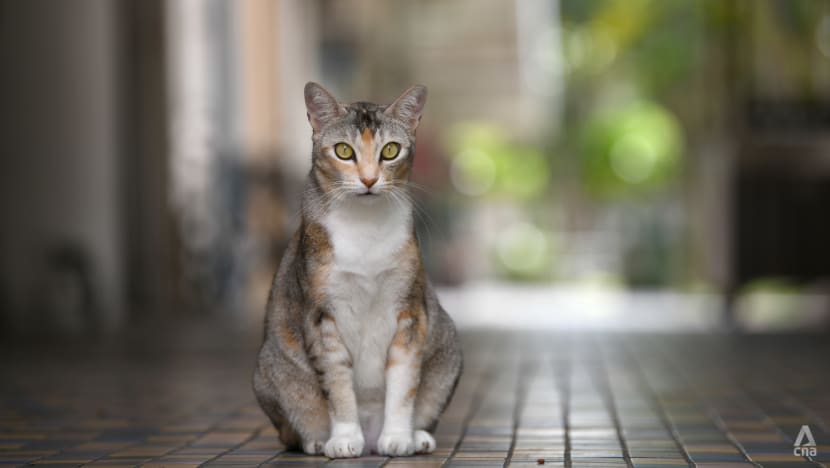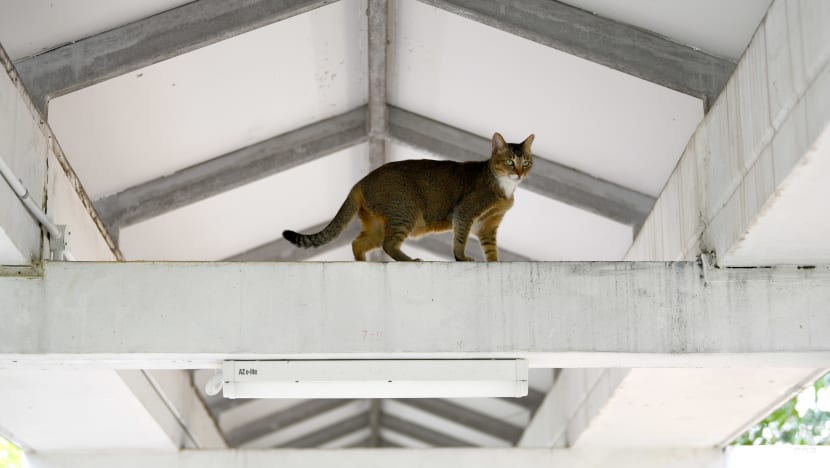Commentary: In regulations on pet ownership, are some animals more equal than others?
AVS is seeking public feedback on HDB’s ban on pet cat ownership, a move welcomed by animal advocates. Responsible pet ownership and greater awareness are key to paving the way for cat ownership in HDB flats, says SPCA’s Aarthi Sankar.

A stray cat at a void deck in Singapore. (Photo: CNA/Calvin Oh)
SINGAPORE: The Animal & Veterinary Service (AVS) recently launched a public consultation exercise to seek feedback on the management of pet and community cats in Singapore.
Animal lovers and welfare groups have welcomed this move, for this might hopefully pave the way for cats to be officially permitted as pets in HDB flats.
Cats have been banned from being kept as pets in HDB flats since 1989, on the grounds that it is difficult to contain cats within a flat and they can pose inconveniences to neighbours such as fur shedding and defecation in public areas.
Understandably, many have regarded this long-standing rule as being unfair to our feline friends that deserve to have a loving home. While the prohibition on the keeping of cats in HDB flats may have deterred some, many continue to keep them as pets.
Without a mandatory licensing system in place, it has been close to impossible to trace and deal with errant owners. Those who have not sterilised their cats contribute to over-population when litters of kittens are born and abandoned.
This leads to cat-related complaints – HDB receives between 1,500 to 1,900 complaints each year, mostly related to irresponsible ownership. But we have noticed that some complainants take issue with the mere sighting of a cat, even if the cat is not a source of public disturbance.

STEREOTYPES PERSIST AT MANY LEVELS
It is human tendency to attribute stereotypes – not only towards pet animals, but also towards their human carers. We often hear that dogs are “man’s best friend”.
Cats on the other hand, are commonly viewed as aloof. But ask any cat owner and they would tell you that this could not be further from the truth.
Just like humans, dogs and cats have personalities of their own. Some cats may not enjoy human attention as much as dogs. Some love human interaction. Whichever the case may be, both domesticated cats and dogs can make great companions, enriching our emotional well-being.
We also often stereotype pet owners too. A woman who has many cats might be termed a “crazy cat lady” while popular memes would caution against trusting people who do not like dogs.
As a society, our tendency to think less favourably of certain people and animals can shape how we treat them in real life. Beyond species, we can also harbour biases about an animal’s age, colour and breed.
The SPCA, like many shelters around the world, is home to a disproportionately larger number of black cats because they are thought to bring bad luck or aren’t as photogenic. According to the RSPCA in the UK, it takes 10 days longer to re-home a black cat compared to a ginger one.
Pedigree dogs are mostly preferred over local mixed breeds because of the belief that they are of better quality and health, with many costing thousands of dollars. This does not translate into being better pets, when “Singapore specials” can be equally loyal family companions too.
Puppies and kittens find homes faster than older pets because of the cute factor, and the perception that they are easier to train.
REGULATIONS EVOLVE WITH PUBLIC ACCEPTANCE
The SPCA and other cat welfare advocates have lobbied for cats to be allowed in HDB flats since the regulation was first introduced. Perhaps it is only being reviewed now as circumstances and attitudes have changed.
The number of pet abandonment cases has risen in the past 5 years, with more than half being cats. The SPCA takes in over 100 cats each month, almost reaching full capacity.
It has become vital to protect these animals while ensuring public health and safety. This can be achieved by rehoming more animals while humanely controlling the population of community cats through mass sterilisation programmes.
New regulations have been trialled and implemented for pet dogs too. In 2012, Project ADORE was first launched to encourage the rehoming of mixed-breed dogs (also known as Singapore Specials) to HDB flats.
Over the last decade, and because of the good practices exercised by Project ADORE adopters, people have become receptive to having these dogs housed within their neighbourhoods. This year, the Project ADORE criteria expanded to allow for larger-sized Singapore Specials to be allowed in HDBs.
LISTEN - XX Files: Creating space for community cats
Similarly, the Love Cats initiative led by Cat Welfare Society at Chong Pang constituency has proven that it is indeed possible to live in harmony with our feline-owning neighbours.
With greater public exposure and an increased acceptance of cats, the time is ripe for the HDB ban to be lifted.
EDUCATION AND NEIGHBOURLINESS KEY TO ALLOWING CATS IN FLATS
Many people still believe that pet cats should not be kept indoors or that they cannot be socialised. These misperceptions must be addressed through education and awareness.
As pet owners, we can all do our part. Simple acts like cleaning up after our pets, removing leftover food after feeding community animals, and sterilising them to minimise disruptive behaviours will go a long way in gaining the trust and acceptance of our neighbours.
Meshing windows and securing doors and gates will safeguard our pets and prevent them from straying or falling from a height.
Pets can bring immense joy and meaning to family life. As many responsible owners will testify, cats and dogs alike can be well cared for in HDB flats.
Part of this responsibility lies in recognising that HDB flats are communal living spaces where neighbours. Pet owners and non-pet owners alike must show consideration for each other.
After all, one does not need to identify as a cat person or a dog person to accept that all animals deserve safe and kind homes.
Aarthi Sankar is Executive Director of SPCA Singapore.


















